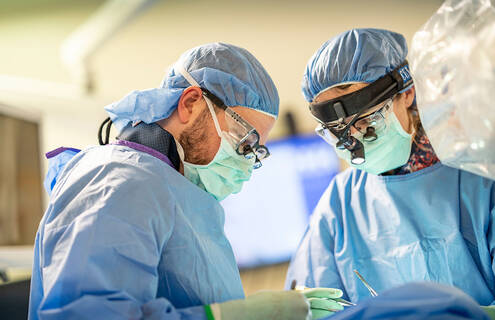
Dartmouth Hitchcock Medical Center's Heart and Vascular Center researchers partnered with the VA Hospital in White River Junction to uncover pandemic-influenced patterns of access to care.
Since early 2020, when COVID-19 disrupted our lives, Dartmouth Hitchcock Medical Center's Heart and Vascular Center researchers, in partnership with the White River Junction VA Hospital, have been dedicated to better understanding how this novel disease has affected our communities and our overall well-being when it comes to accessing vascular care.
This multi-institutional team sought to answer two questions: Why do vascular surgeries continue to decline, and who are the people who are most affected?
The goal: To find the answers to these questions using Medicare claims data and rebuild our healthcare system with purpose so the most vulnerable people have access to the care they need.
The research
Using nationwide Medicare claims data, researchers investigated whether the rates of certain vascular procedures had returned to more "normal" pre-pandemic levels. The Heart and Vascular research team, led by Philip P. Goodney, MD, MS, found that access to certain types of vascular surgery were significantly affected, especially for patients with life-threatening health concerns such as aneurysms or stroke. The research further revealed that while all types of people were affected, younger people and marginalized individuals sought fewer vascular services overall.
Brianna M. Krafcik, MD, a fourth-year resident and research scientist at Geisel School of Medicine, shares,
"Essentially, what we're seeing is that specific groups of people are more vulnerable to the lasting impacts of COVID-19 on human behavior and patterns of care. In short, it's safe to say that COVID-19 continues to disparage marginalized individuals, which further reduces that person's ability to live well longer."
Louise Davies, MD, of the White River Junction VA, who co-leads the VA Disrupted Care National Project (DCNP) stresses, "By examining which groups have been most affected and who is at most risk of complications if they do not receive care, we can identify where resources should be focused to maximize the health of this population as we emerge from the pandemic."
Rebuilding our health system with purpose
This study highlights the ongoing need to remain focused on rebuilding our healthcare delivery systems and ensuring people have access to the care they need. These findings will help to ensure that health systems remain attentive to the most vulnerable patients and maintain access to critical surgical care.
The results revealed significant differences in numbers of commonly performed vascular surgeries. Of the surgeries used as representative for overall trends, the two that declined most were Carotid Endarterectomy, a surgery to remove blockages in the artery that supplies blood to the brain and Intact Abdominal Aortic Aneurism repair, a surgery to fix a bulge in a major blood vessel in the abdomen.
Intact Abdominal Aortic Aneurism Repair
- -46.9% change Q2 2019 vs Q2 2020
- -16.3% change Q3 2019 vs Q3 2020
- -25.1% change Q1 2019 vs Q1 2022
Carotid Endarterectomy
- -39.5% change Q2 2019 vs Q2 2020
- -22.1% change Q3 2019 vs Q3 2020
- -33.5% change Q1 2019 vs Q1 2022
Major Lower Extremity Amputation
- -13.6% change Q2 2019 vs Q2 2020
- -10.6% change Q3 2019 vs Q3 2020
- -24.7% change Q1 2019 vs Q1 2022
Published in Annals of Vascular Surgery: "The Sustained Impact of the COVID-19 Pandemic on Vascular Surgical Care Delivery"